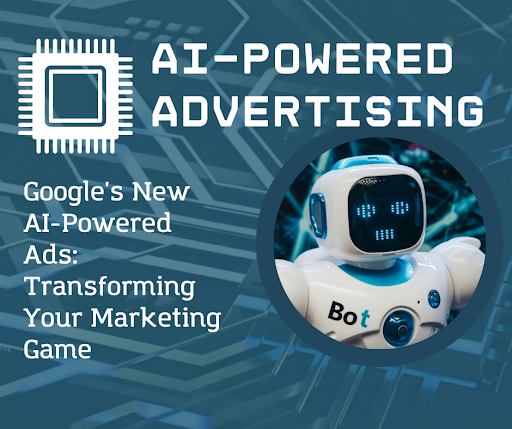AI incorporation in marketing has been adopted by many companies in the management of their Google Ads campaigns thus enabling them to achieve better results about ROI.

AI also has the benefit of collecting lots of data and sometimes finding patterns that the human mind would not be able to discern, especially when it comes to ad targeting. AI can pull data from users’ behavior, search, and demographic histories, among others. This allows companies to send specific messages to the proper users at the right time, improving the probability of sales customers.
For example, AI can aid in determining probable customers who will interact with certain ads. With user requirements and behavior, AI ensures the ad is appealing to users, leading to higher click-through rates (CTR) and well-performing ads.
The traditional procedure of bidding is a direct type of bidding, which is hugely time-consuming and makes the bidders suffer from low QoS due to improper selection of the VM. AI in advertising makes the management of the bidding process easier as follows. Google Ads’ Smart Bidding, for example, automates bidding through machine learning to get the best possible result for each auction with the business’ budget.
AI takes into account the device, location, time of day, or the intent of a user for the bid to be changed instantly. This level of automation not only saves time but the return on investment is made to the highest level since decision making involves analysis which cannot be realized by humans. Industry players can adopt certain objectives for the campaign like conversion or even the target ROAS, and I shall optimize the bids to achieve such objectives positively.
Therefore, the development of appropriate slogans and images that will attract the target population is significant. AI can create unique ad content that will be relevant for one particular target group and different from those relevant for another group and different environments. Based on the data of users and their behavior, AI can generate various variations in presenting the ad to certain clients.
For instance, when a user often searches for content that is related to traveling, AI can develop advertisements that may capture the attention of such users through special travel promotions or whatnot. This level of customization makes the user have a good experience and makes him/her likely to engage in the advertisements thus making them perform better.
Further, it is also useful in deciding on the image quality and form of videos and other similar relative content for relevance with attractive appearances. This capability enables firms to make several creatives and find out which one will be appropriate for its audience in advertising or a particular occasion.

Evaluating the effectiveness of an advertising campaign is important to make the right decisions. Another advantage of AI-based solutions is the ability to extract further information about ads’ effectiveness through big data analysis. These tools can help to find patterns, to recognize deviations, and to offer ways of improvement of campaigns.
AI is also intelligent enough to come up with trends and forecasts of the future given past occurrences, thus guiding business strategies a priori. This is in an attempt to achieve accurate and informed decision-making that leads to better ad performances, increasing the Returns on Investment.
Also, AI can help in automating the preparation of reports that provide comprehensive data on performance and specific indicators of productivity. This automation helps to ease the process for the marketing staff and thus helps them to only concentrate on developing and implementing the strategies.
To develop proper, effective ads, it is crucial to know individuals’ behavior. Advertisement through AI offers useful recommendations to the business world on their clientele. AI analysis of several data sources enables one to define customers’ preferences, their purchase behavior, and their pains.
They also help businesses to develop tailored content that will be loved by most of their audience as is the case with adverts. Through this strategy, the audience is engaged and provided what they want, therefore increasing the chances of a company’s conversion rates.
Further, it can segment all audiences accurately, wherein companies can reach the specific region or area of interest to serve a particular message or concern. That way waste of advertising in the wrong or undesired portrayals is minimized, making the crusade more efficient as well as effective.
Perhaps, one of the valuable features of using Artificial Intelligence in advertising is the flexibility of assessing and improving campaigns. Unlike old-school advertising where someone has to intervene physically to make changes and also takes a long to implement; AI can alter campaigns in real time to ensure they are highly effective.
For instance, if an advertisement is not generating the desired traffic, AI will pinpoint a problem and optimize, say, the bid price, the text, or the target audience. Real-time optimization helps businesses be able to tweak their strategies very fast when it comes to market issues and keep the efficiency of the campaigns high.

AI solutions in advertising also imply considerable savings, for instance, the use of natural language processing in the context of electronic media. There are several means by which businesses are in a position to save time and be relieved from many things that they have to do by manual means. AI can optimize and answer budgeting questions to know where to spend money on what ad and which ad to spend money less on.
Moreover, through AI, one can know the best time to run the ads when the users are most active, maximizing the chances of users clicking on the ads. Such beneficial distribution of resources improves the general expenditure and efficiency of investment funds usage.
Fraud remains a common issue among companies and organizations, especially in advertising fraud cases, where losses amounting to billions of dollars are reported annually. The importance of using AI in fighting fraud in advertising campaigns lies in its ability to detect patterns and anomalies, pinpointing illicit activities such as click frauds aimed at embezzling an advertiser’s click budget.
It also has the potential to track the traffic sources and guarantees that the ads are placed before real users; thereby safeguarding the business ventures against the loss-making tell-tale signs of fraudulent clicks.
Contrary to the belief that AI is only related to data and is making advertising robotic, AI creates novelty and creativity in advertising. Thus, AI takes the brunt of repetition and heavy lifting and relieves human marketers to brainstorm unique ad campaigns and narratives.
With the help of AI, it is possible to use such tools to help in coming up with ideas during a brainstorming session and offer creative ideas based on data. For example, AI can go through successful ad campaigns and see, which aspects and characteristics contributed to these successful campaigns’ creation, to then replicate those aspects for new campaigns.
As artificial intelligence technology advances, advertising will be impacted. Advanced NLP capabilities as a future trend in AI-powered advertising are anticipated to enable more personalized and conversational ad experiences. Moreover, AI-driven voice search optimization is poised for growth as voice assistants become popular with consumers seeking products and services.
Besides, cross-channel advertising strategies will further exploit AI integration to ensure seamless and coherent messaging across various platforms ranging from social media to search engines through display networks.
A legal firm specializing in criminal defense cases, including sex crimes, domestic violence (DV), and drug charges, provides an excellent example of how AI-powered advertising can enhance a lawyer’s Google Ads performance. Before integrating AI into their advertising strategy, the firm faced several challenges, including high competition, rising costs per click, and difficulty in reaching their target audience effectively.
The Legal Team needed to improve their ad performance and reduce their cost per acquisition (CPA) while reaching potential clients at the right moment. They also sought ways to personalize their ads to make them more relevant and engaging, ensuring they addressed the specific legal concerns of their potential clients.
The firm decided to leverage AI-powered advertising tools to overcome these challenges. They implemented several AI-driven strategies:
After implementing these AI-driven strategies, the Legal Team saw significant improvements in their Google Ads performance:

The case of the Legal Team demonstrates the transformative impact of AI-powered advertising on Google Ads performance. By leveraging AI’s capabilities in targeting, bidding, ad creation, and performance analysis, the firm was able to overcome challenges and achieve its advertising goals. This success story underscores the potential of AI to enhance the effectiveness and efficiency of advertising campaigns, making it an invaluable tool for businesses in the digital age. For those seeking to elevate their legal practice’s visibility and client outreach, the Attorney Marketing Network offers unparalleled expertise in integrating AI-driven strategies with traditional marketing approaches. Contact us today to discover how our tailored solutions can drive your firm’s growth and success.